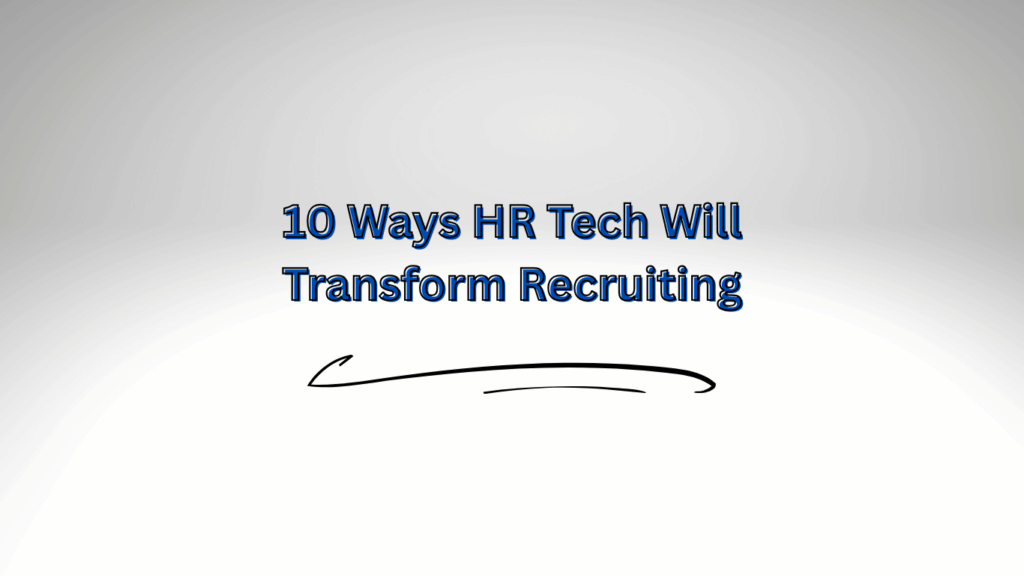The recruitment landscape is in the midst of a profound transformation, driven by an accelerating pace of technological innovation. Over the next five years, HR technology will not simply optimize existing processes—it will fundamentally redefine the roles of recruiters, the experience of candidates, and the strategic value of talent acquisition within an organization.

Here are 10 ways HR technology will change recruiting by 2030:
1. The Rise of Augmented Intelligence (AI)
AI will move from a mere automation tool to a strategic partner for recruiters. Instead of simply screening resumes for keywords, AI systems will use predictive analytics to forecast the long-term success of a candidate, analyze their potential for growth within the company, and even predict their likelihood of accepting a job offer. These systems will integrate with a recruiter’s daily workflow, providing real-time insights and recommendations, freeing recruiters to focus on high-value human interaction.
2. Hyper-Personalized Candidate Journeys
Generic application portals and mass-email campaigns will become obsolete. By 2030, recruitment platforms will leverage AI to create hyper-personalized experiences for every candidate. This means a candidate’s journey, from the first touchpoint to the offer letter, will be customized based on their skills, career aspirations, and communication preferences. For example, a system might automatically recommend a specific job role, a relevant blog post about company culture, or even a personalized video message from a recruiter, all tailored to the individual’s profile and behavior.
3. Skills-Based Hiring, Authenticated by Blockchain
The traditional resume and degree will take a backseat to verifiable skills. Blockchain technology will be used to create a decentralized, tamper-proof record of a candidate’s skills, certifications, and work history. This will eliminate resume fraud and the need for time-consuming background checks, creating a single source of truth for a candidate’s credentials. Recruiters will be able to instantly verify a candidate’s expertise, leading to a more meritocratic and equitable hiring process.
4. Immersive Virtual Reality (VR) Interviews and Job Simulations
Forget video calls. VR will provide a new dimension to interviews, allowing recruiters to assess candidates in an immersive, real-world context. Candidates might participate in a virtual tour of the office, interact with their potential future team in a digital space, or complete a job simulation that mirrors the actual tasks of the role. For a software engineer, this could mean debugging code in a virtual environment; for a manager, it could be a role-playing scenario to assess leadership skills. This will provide a richer, more objective assessment of a candidate’s abilities and cultural fit.
5. Conversational AI and Intelligent Chatbots
Chatbots will evolve beyond simple FAQs. By 2030, conversational AI will be able to engage in complex, natural language conversations with candidates 24/7. These intelligent bots will not only answer questions about the job or company but also conduct initial screening interviews, assess a candidate’s communication skills, and provide instant feedback on their application status. This will significantly improve the candidate experience by providing immediate, on-demand support and transparency.
6. Predictive Workforce Planning
HR tech will empower organizations to look far into the future. Advanced predictive analytics will analyze internal and external data to forecast talent needs with remarkable accuracy. This means companies will be able to identify potential skill gaps in their workforce 18-24 months in advance, allowing them to proactively source talent or invest in upskilling their current employees before a problem arises. Recruitment will shift from a reactive function to a strategic, forward-looking business driver.
7. Data-Driven Diversity, Equity, and Inclusion (DE&I)
HR technology will become a powerful tool for eliminating unconscious bias and building a more diverse workforce. AI will be used to scrub identifying information from resumes, analyze job descriptions for biased language, and ensure that sourcing efforts reach a diverse pool of candidates. Real-time dashboards will provide recruiters and hiring managers with data on diversity metrics at every stage of the hiring funnel, allowing them to intervene and correct course if bias is detected.
8. Gamification for Assessment and Engagement
The hiring process will feel less like an administrative chore and more like an engaging experience. Gamified assessments will be used to evaluate a candidate’s problem-solving skills, cognitive abilities, and cultural fit in a fun, interactive way. These games will not only provide a more accurate and objective assessment but also enhance the employer brand, making the company an appealing destination for top talent, particularly younger generations.
9. A Unified Communications Ecosystem
The fragmentation of recruitment channels—email, LinkedIn, text, and phone—will be a thing of the past. HR tech platforms will unify all candidate communication into a single, comprehensive timeline. Recruiters will have a complete view of every interaction, from the first chatbot conversation to the final interview, all in one place. AI will even be able to transcribe calls and draft follow-up notes, minimizing administrative burdens.
10. The Recruiter as a Strategic Advisor
As technology automates the operational and administrative tasks of recruiting, the role of the recruiter will be elevated. Recruiters will spend less time on manual sourcing and screening and more time on strategic activities. They will become talent advisors to hiring managers, leveraging data and insights from HR tech to inform hiring decisions.31 They will focus on building deep, meaningful relationships with top candidates and nurturing talent pipelines, becoming a critical link between business strategy and human capital.
